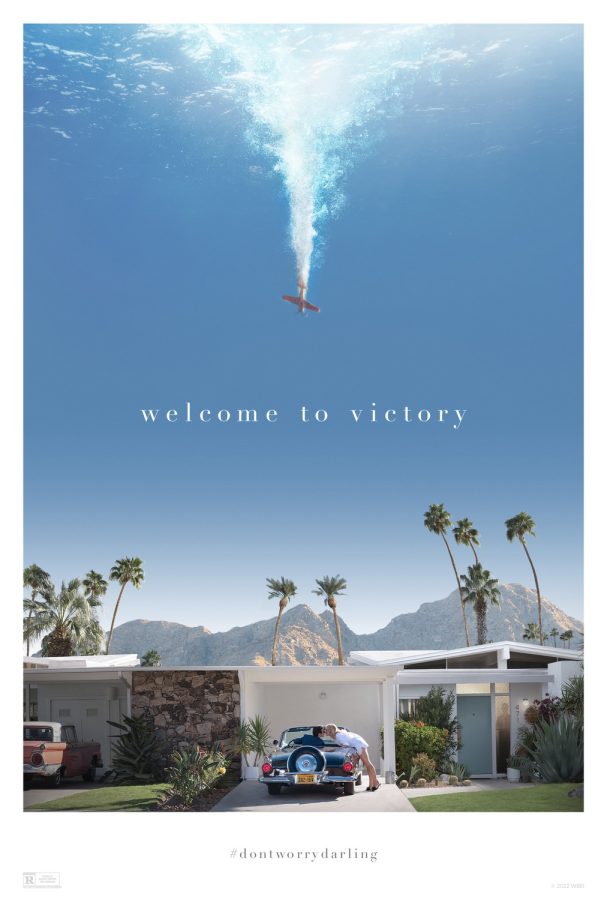Despite internal drama, Don’t Worry Darling proves itself beyond expectations
October 10, 2022
The psychological thriller “Don’t Worry Darling” is a mind-bending dystopian film which comments on the stereotypical roles of men and women in society. Although the film fell under public scrutiny because of extensive press drama before its release, the movie itself is visually stunning with a fascinating storyline.
The story takes place within the Victory Project, an experimental community designed so that men can go to work in a secret facility while their wives cook and clean at home. It’s a glamorous world of men in flashy suits and women in pretty dresses that begins to crumble the moment any character questions it. The protagonist, Alice, initially feels at peace with the community, but begins to doubt the true nature behind the Victory Project, shown through Alice’s trances.
The psychological thriller aspect is a prominent part of the film. The film is directed by Olivia Wilde, who also plays a supporting role as a content wife in the community. Wilde drives the suspense with the symbolism of objects, phrases, background music and costuming. The horror aspect of the movie does not rely on gore; rather it is dependent on the audience’s gradual realization of the symbolism as the movie progresses. Harmless and casual actions such as the women taking ballet classes or different characters humming are tied to awful, vague and eerie secrets. One of the many crucial scenes repeated in slightly different variations throughout the movie is Alice’s visions: a bird’s eye view of women turning and laying on the ground circling their legs in unison, then cutting to the iris of an eye and drops of blood, before returning back to the women dancing in circles. The background is filled with humming of the same staccato note over and over. Although these scenes last only seconds, they have an enormous effect on the chilling ambience.
“There’s beauty in control, there’s grace in symmetry as we move as one,” is a line repeated at multiple points in the movie and chanted during one of Alice’s creepy visions. Although a seemingly normal statement as a stand-alone line, it becomes the scariest phrase, tying Alice’s visions together. The most significant interpretation of this line is that the Victory Project as a whole is a seemingly perfect world that never truly makes a single person living there happy.
Another repeated symbol is Alice and her friend Margaret’s reflections in glass windows. One scene featured in trailers portrays Alice’s body stuck to glass, which parallels Margaret’s violent appearance in a ballet class mirror. Both of these characters are the women who realize the truth of their community, giving the mirrors and windows a deeper meaning.
The filmmakers also use contrast to confuse the audience on whether they should be scared or relieved, adding to the tension of the movie. The darkest scenes always cut abruptly to a scene such as bacon sizzling in a pan with cheery music playing, leaving behind a bittersweet mood.
Whether criticizing humans’ tendencies to desire power as a whole or men specifically, “Don’t Worry Darling” delivers social commentary, making the Victory Project an exaggerated version of the world many try to break free from.
There are also many direct allusions to the old-fashioned housewife and working husband trope scattered throughout the plot. The film reaches its climax with a shocking confrontation between Alice and her husband, Jack, in which all is revealed and they make life-changing decisions. Although the housewife and working husband trope is slightly overdone in the movie industry, “Don’t Worry Darling” keeps it subtle enough, not taking away from the tension and suspense.
In the end, the film emphasizes that it doesn’t all boil down to a villainous man, but to a group of people who only ever wanted to be happy. Bunny, played by Wilde herself, is one of the many individuals who chose Victory life for a heartbreaking reason, heightening the commentary on how humans do anything to ease their pain, even if it means sacrificing the happiness of others.
Although some critics consider the resolution to leave too many plot holes, leaving out some explanations makes the movie significantly more thoughtful. By letting the audience decide for themselves what actually happened, the movie is more engaging. For instance, the last interaction between the leader of Victory, Frank, and his wife, Shelley, is left open for interpretation, which made the movie enjoyable as the audience can piece together how they believe the film ended. The open-ended nature of the Victory Project as well as the ambiguous ending was wonderfully executed.
Because “Don’t Worry Darling” came under so much public scrutiny in the weeks leading up to its release, some may be looking for a reason to call the movie unprofessional, despite its merits as a film. The cast of “Don’t Worry Darling” is a mix of many famous celebrities, including Florence Pugh, Harry Styles, Gemma Chan and Chris Pine. Much of the movie’s controversy is rooted in Wilde’s choice to cast Styles, who has little acting experience. Style’s acting was noticeably shallow and did not do his character, Jack, justice. Jack’s character is about balancing his villainous male-manipulator side and dealing with the guilt he faces for what he did to Alice, on top of experiencing the pure happiness, fear and stress of the Victory Project. Styles didn’t portray the depth of his character, which is evident in many scenes where he boils down a series of complicated emotions to one emotion. Especially when put next to award-winning actress Pugh, the backlash is reasonable. Lead actress Pugh showcased Alice as an intelligent woman with complexity and made her performance incredibly believable.
Although understandable, the public drama, such as an overly heightened focus on couple Wilde and Styles at events leading up to the film’s release, does not reflect the quality of the movie itself. When the off screen drama is separated from the cinematography, plot, characters, writing and music of the movie itself, “Don’t Worry Darling” is a nuanced and thrilling movie.




























































